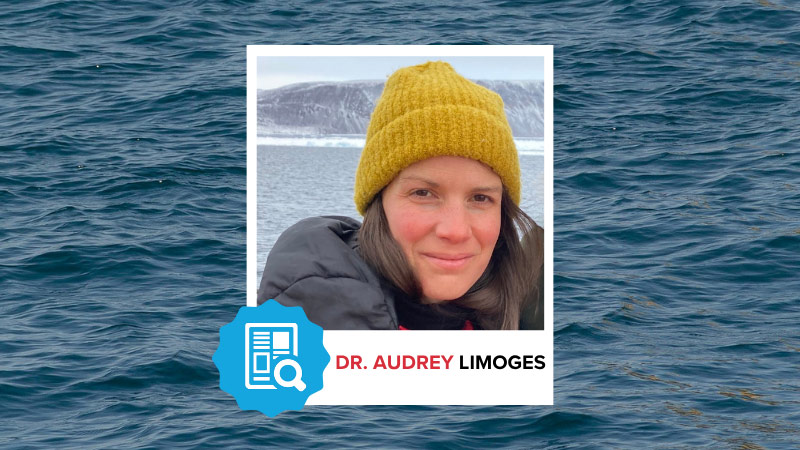Sustainability Research Champion: Dr. Audrey Limoges
Author: UNB Sustainability
Posted on Jun 16, 2025
Category: Sustainability Research Champions

Universities play a crucial role in achieving a sustainable future, especially through their research. Considering this, we are excited to highlight individuals and groups at UNB that have dedicated their time to pursuing sustainability-related research.
Our newest Sustainability Research Champion is Dr. Audrey Limoges
Research project
Phycotoxins in the Arctic Marine Ecosystem: An Emerging Climate Change Risk (PHATE)
Overview of research
The Arctic is becoming an increasingly favorable environment for harmful algae. Harmful algae can release phytotoxins that can pose a significant threat to ecosystem and human health, as they can bioaccumulate in higher trophic level organisms.
This emerging climate-driven risk is particularly important in Inuit coastal communities, which face high prevalence of food insecurity and where traditional harvesting activities, and marine food sources are central to diet, nutrition, culture and well-being.
Assessing the effects of harmful algae requires a multi-faceted approach including understanding the influence of large-scale ocean processes coupled with phytoplankton dynamics and trophic interactions, as well as downscaled models capturing local ecosystems and socio-economic perspectives. The overarching objective of PHATE is to assess the risk for, and develop strategies to monitor, predict, manage and adapt to the impacts of harmful algal blooms in the Arctic.
This project received funding from both the NordForsk-Led International Joint Initiative on Sustainable Development in the Arctic, and ArcticNet. The project involves many Nordic countries.
In Canada, I lead the initiative alongside Michelle Saunders (Nunatsiavut Government) and Noah Brosseau (Nunavik Research Centre). Together, we are guiding an interdisciplinary team of more than 25 experts, including researchers in natural and health sciences, Inuit Knowledge Keepers, wildlife specialists, health professionals and policymakers.
The team is working collaboratively across the North Atlantic-Arctic region to implement a locally adapted, operational framework for the detection and prediction of harmful algal blooms.
Our goal is to support the development of risk management strategies, clinical practices, and community resilience in Nunatsiavut, Nunavik, and beyond.
The project will:
- combine in situ approaches to monitor the past and present presence of toxigenic species including the implementation of state-of-the-art remote sensing algorithms
- study the accumulation of phycotoxins in marine organisms through transfer in the food web
- develop models and predictive tools for early detection and warning of harmful algal blooms, and risk management strategies.
How does your work intersect with sustainability?
PHATE aims to empower Inuit communities and local professionals in implementing Inuit-adapted strategies for early on-site detection and rapid response to harmful algal blooms (HABs).
This project will contribute to:
- assessing the risk HABs pose to the safe consumption of country food and the overall health and well-being of communities,
- strengthening the capacity and infrastructure of Inuit research centres to detect and monitor HABs, and
- examining the impacts of HABs on ecosystem health and the essential provisioning and cultural services they provide. Ultimately, this program aims to support food security and Inuit rights to health equity.
What impact do you hope this research will have?
This project will strengthen Inuit Nunangat's response and adaptation to the emerging threat of phycotoxins while ensuring safe consumption of marine foods and sustaining Inuit self-determination for local monitoring and risk management.
Successful mitigation of phycotoxins' harmful impacts depends on accurate and reliable toxin detection methods in environmental and food samples. It is also important that these methods are adapted to the local context.
In addition to addressing a critical gap in scientific knowledge about HABs in the Arctic, this project will advance cutting-edge, cost-effective, on-site genomic techniques and support capacity building.
Where can people find information about your work?
I am on LinkedIn and there's a website in the works.
Know someone who should be a Sustainability Research Champion? Let us know at sustain@unb.ca.